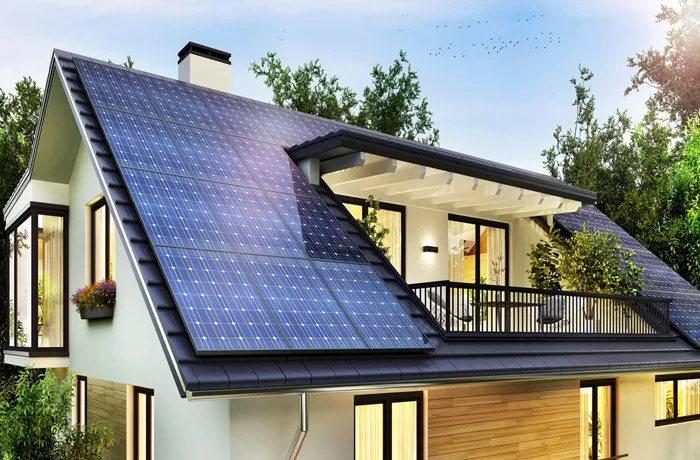Integrating a whole-house generator with solar panels offers a powerful and sustainable energy solution. This hybrid system can enhance energy reliability, reduce fuel consumption, and support a greener lifestyle. However, successfully operating and maintaining such a system involves understanding several key considerations. This article explores the crucial points to pay attention to when using a whole-house generator in conjunction with solar panels.
Understanding the Synergy Between Solar Panels and Generators
Before delving into specific considerations, it’s essential to grasp how solar panels and whole-house generators work together.
Solar Panels Overview
Solar panels capture sunlight and convert it into electricity through photovoltaic cells. This process generates direct current (DC) electricity, which is then converted into alternating current (AC) by an inverter to be used in your home.
Whole-House Generator Overview
A whole-house generator provides backup power during outages by running on fuel such as natural gas, propane, or diesel. This generator ensures that all critical systems and appliances in the home remain operational during a power interruption.
Key Considerations When Using a Whole-House Generator with Solar Panels
System Design and Integration
Proper System Design: Designing a hybrid system that integrates both solar panels and a generator requires careful planning. The system must be sized correctly to meet your home’s energy needs while balancing solar generation and generator capacity.
Compatibility: Ensure that the solar panel system and generator are compatible. This includes checking that the inverter and battery storage can handle the load and that the generator can operate efficiently with the solar setup.
Energy Management
Energy Storage: Incorporating a battery storage system is crucial for managing energy produced by solar panels. These batteries store excess solar energy for use when sunlight is insufficient, reducing the reliance on the generator.
Load Management: Efficiently managing your home’s energy load is vital. Prioritize essential systems and appliances to ensure they are powered during outages, and use solar energy as much as possible to reduce generator runtime.
Installation and Maintenance
Professional Installation: Engage professional installers to ensure proper integration of solar panels and the generator. This helps avoid compatibility issues and ensures that the system complies with local codes and regulations.
Regular Maintenance: Both solar panels and generators require regular maintenance. Solar panels need occasional cleaning and inspection, while generators require routine servicing, including fuel checks and engine inspections.
Financial Considerations
Initial Costs: The upfront cost of installing a whole-house generator with solar panels can be significant. This includes the cost of the generator, solar panels, inverters, battery storage, and installation.
Long-Term Savings: Although the initial investment is high, the long-term savings on energy bills and reduced fuel consumption can offset the costs. Additionally, some regions offer incentives or rebates for installing solar systems, which can further reduce costs.
Environmental Impact
Sustainability: Solar panels provide a renewable energy source, significantly reducing your carbon footprint. Using a generator as a backup ensures that you can rely on renewable energy when possible, while minimizing the use of fossil fuels.
Fuel Efficiency: Modern generators are designed to be more fuel-efficient. By combining them with solar panels, you can further reduce the amount of fuel required, leading to both environmental and cost benefits.
Safety and Regulations
Safety Measures: Ensure that all safety measures are followed, including proper ventilation for the generator and safe installation practices for solar panels. Regular safety checks are essential to prevent hazards.
Compliance with Regulations: Adhere to local regulations and codes for both solar panel installation and generator use. This includes obtaining necessary permits and ensuring that the system meets all safety and operational standards.
see also: Is a Solar Portable Generator a Good Choice?
Conclusion
Utilizing a whole-house generator with solar panels presents an opportunity to enhance energy reliability, reduce fuel consumption, and support a more sustainable lifestyle. By focusing on system design, energy management, installation, maintenance, financial considerations, environmental impact, and safety, homeowners can effectively manage their hybrid energy system and enjoy the benefits of both technologies. Proper planning and regular upkeep are key to maximizing the efficiency and reliability of this integrated solution.
FAQs:
What size generator is needed for a whole-house system with solar panels?
The size of the generator depends on your home’s energy needs and the capacity of your solar panel system. It should be capable of handling the maximum load during outages while considering the supplemental power from solar panels.
How often should I clean and maintain my solar panels?
Solar panels typically require minimal cleaning, but it is advisable to inspect them every 6 to 12 months. Maintenance involves checking for debris, ensuring the panels are free from damage, and verifying that they are functioning optimally.
Can solar panels fully replace the need for a whole-house generator?
While solar panels can significantly reduce the need for a generator, they may not completely replace it, especially during extended periods of low sunlight or high energy demand. The generator serves as a backup power source when solar energy is insufficient.
What are the typical lifespan and maintenance requirements of a whole-house generator?
Whole-house generators generally have a lifespan of 10 to 15 years. Regular maintenance includes checking fuel levels, inspecting the engine, and performing routine tests to ensure the generator is in good working condition.
Are there any government incentives for installing solar panels with a generator?
Many regions offer incentives or rebates for installing solar panels, which can reduce the overall cost. Check with local authorities or energy providers for information on available incentives and eligibility requirements.
Related topics:
- Top 2 Solar Generator for Whole House
- 3 Best Solar Generator for Preppers
- What Are Tidal Energy and Wave Generators?

